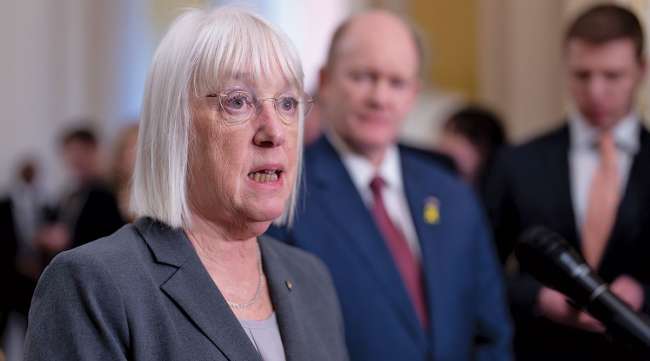Senior Reporter
FY25 Federal Funding Bills on Congress' Summer Agenda

[Stay on top of transportation news: Get TTNews in your inbox.]
WASHINGTON — A fiscal 2025 bill to ensure funding for the U.S. Department of Transportation is on Congress’ agenda this summer.
The Senate Appropriations Committee will kick off its consideration of the comprehensive transportation measure when senators return to Capitol Hill after the July Fourth holiday. Democratic leaders said they plan to begin scheduling votes on the annual federal funding measures before the August congressional recess.
“Last year, we were able to produce strong, bipartisan bills in committee. I am very hopeful we will be able to do the same again this year,” Senate Appropriations Committee Chairwoman Patty Murray (D-Wash.) said June 18.
“I plan to hold our first [fiscal year 2025] markup the week we return from the [Fourth of July] recess,” the senator continued. “And I look forward to working with all of my colleagues to make sure we meet this moment, take the concerns we are hearing about back home, and write and pass strong, bipartisan Senate Appropriations bills.”
Senate budgetary action would mirror the House GOP’s summer agenda. A House subcommittee scheduled a vote on the fiscal 2025 transportation appropriations bill for June 27. Its full House committee vote is scheduled for July 10.

Cole
House leaders intend to pass the annual transportation bill, as well as the other funding legislation, before August. During negotiations, bicameral disputes have centered on funding levels for certain security and domestic programs. Last month, House Appropriations Committee Chairman Tom Cole (R-Okla.) said, “In the face of an aggressive schedule and fiscal constraints, we will demonstrate responsible governance and safeguard hard-earned tax dollars.”
“The bills written by this committee will adhere to law set by the Fiscal Responsibility Act — with no side deals — and focus resources where they are needed most. Our [fiscal year 2025] process will reflect our commitment to strengthening our national defense, supporting the safety and security of the American people, and reining in government to its core mission,” Cole went on.
Funding authority at DOT and most of the federal government expires Oct. 1. Congress needs to clear for the president’s signature new fiscal year bills by Sept. 30 to avert a partial shutdown.

Buttigieg
This year, senior administration officials have traveled to Capitol Hill to defend President Joe Biden’s fiscal year budget request. Last month, Transportation Secretary Pete Buttigieg explained to appropriators the need for a new round of robust infrastructure funding. He pointed to DOT’s economic role: “We have delivered safer, stronger transportation across every mode, across the country. Roadway fatalities are at last trending downwards, shipping costs are down as supply chains are running more smoothly, and airline cancellations last year were the lowest in a decade.”
RELATED: Buttigieg Promotes Infrastructure Law During Election Year
In fiscal 2025, the White House is requesting $964.5 million for the Federal Motor Carrier Safety Administration. Also, the White House is requesting for the Federal Highway Administration $62.8 billion; for the Federal Transit Administration $16.8 billion; for the Federal Railroad Administration $3.2 billion; and for the National Highway Traffic Safety Administration $1.2 billion.
“The budget provides a total of $78.4 billion for highway, highway safety and transit formula programs, supporting the amounts authorized for year four of the bipartisan infrastructure law,” according to background information the White House provided. “The budget also reflects an additional $9.5 billion in advance appropriations provided by the bipartisan infrastructure law for bridge replacement and rehabilitation, electric vehicle charging infrastructure, and other programs to improve the safety, sustainability, and resilience of America’s transportation network.”
The $1.2 trillion Infrastructure Investment and Jobs Act is commonly referred to as the bipartisan infrastructure law. Biden signed it into law Nov. 15, 2021.
Want more news? Listen to today's daily briefing below or go here for more info:




